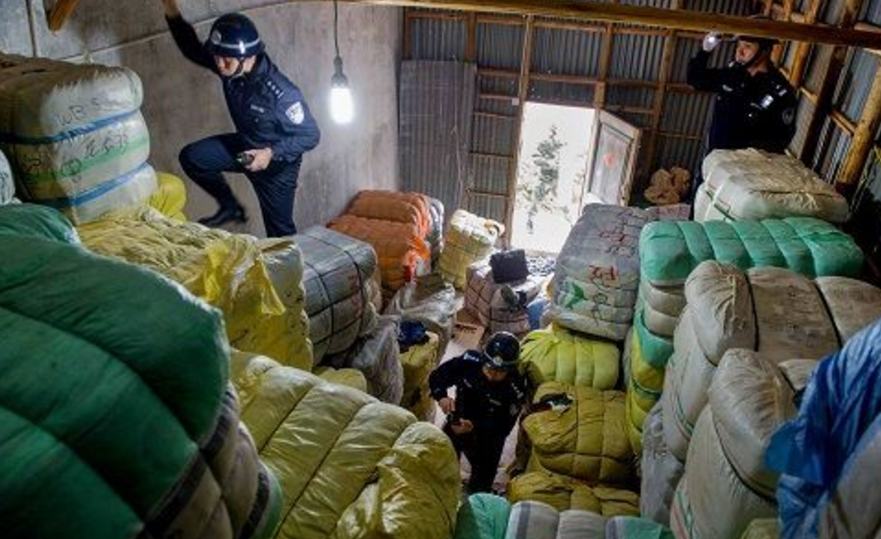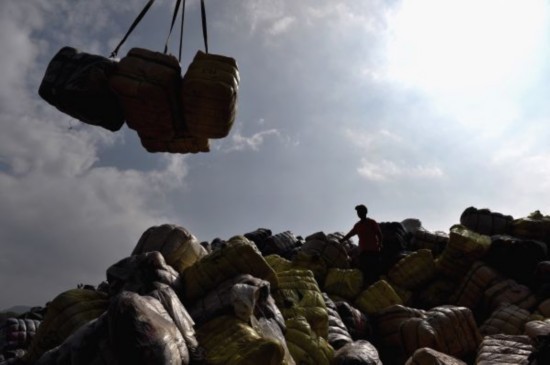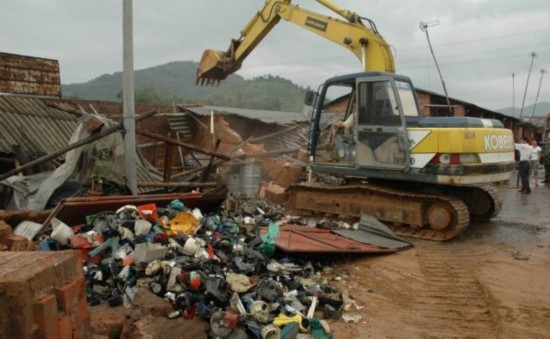The Information Network reported on October 22 that the British media said that three months ago, the Chinese government decided to ban the import of 24 kinds of waste in order to combat the "foreign garbage" problem. According to a report from the BBC website on October 20th, China's waste recycling companies imported millions of metric tons of waste each year from other countries for recycling. The International Bureau of Recycling estimates that China imported 7.3 million tonnes of waste plastic and 27 million tonnes of waste paper from Europe, Japan and the United States last year. Werner, chairman of the American Waste Recycling Industry Association, revealed that there are about 155,000 workers in the local area who work directly with exporting scrap materials to China. The average wage is $76,000 and they pay more than US$3 billion in taxes to U.S. governments at all levels. He pointed out that if China really wants to prohibit the import of these "foreign garbage," it will cause a "disastrous blow" to the recycling industry. According to the report, in the eyes of China, the reason for prohibiting the import of foreign waste is simple: environmental pollution. The documents submitted by China to the World Trade Organization pointed out that a large amount of “dirty and even harmful waste†in imported waste was mixed with solid waste that could be used as raw materials, seriously polluting China’s environment. According to Baxter, the foreign recycler of RPC, the UK recycler, the cheapest way to deal with these wastes was to put them all in containers and hand them to workers at cheaper wages. The report stated that with the implementation of the ban by China at the latest by 2018, the British recycling industry has already believed in environmental, food, and rural affairs and asked the authorities to assist them in dealing with the problem of waste accumulation that will occur. Bird, who is the chairman of an advisory committee of the local government recycling industry in the United Kingdom, believes that even if China no longer imports waste from foreign countries, the United Kingdom can still export the waste to other places, such as India and other Asian regions. However, there will be a slight change in the price, which is always a crisis for the local government. According to the report, after China reforms its policy of importing foreign waste, the recycling industry needs to allocate more funds to deal with the problem of excess global waste. For Bird, a local government recycling industry advisory board in the United Kingdom, the responsibility for solving long-term waste problems must be spread throughout the global product supply chain, especially manufacturers. He said that a particular change may have a huge impact: expand producer responsibility. "This means that producers must pay the price to ensure that the products they are manufacturing can be treated in an effective and environmentally friendly and cost-effective manner."

Profile picture: Shantou Customs and Lufeng Public Security, Frontier Defense, Smuggling, Industry and Commerce departments destroyed a smuggling and importing old clothing storage den in Tangshi Town (photo taken on March 3rd). Xinhua News Agency Reports British Media Says China's Ban on Imports of “Foreign Garbage†Has Alarmed the World Recycling Industry Reference News Network reported on September 25 that the Chinese government has decided to ban the import of recyclable waste products from countries including the United Kingdom from the end of 2017. . According to a report from the British Broadcasting Corporation website quoted by the Times on September 21, China’s practice is part of efforts to reduce and clean environmental pollution. There is nothing wrong with this, but China’s total ban on the import of recyclable waste from abroad will cause a chain reaction and The world has a huge and far-reaching impact. Reported that the first to bear is the packaging industry. It is reported that the international export of recyclable waste products to China amounts to tens of billions of dollars. According to reports, these products include plastic bottles, waste paper, cartons, packaging polyethylene, PVC, etc. that were collected at home and then collected by local governments. Brunett, headquartered in Brussels' International Recycling and Recycling Bureau, said that China's ban will affect the global economy. According to the report, China's ban on the import of waste recovered overseas may be related to strengthening domestic environmental protection measures. At the same time, the Beijing government is worried about China's environmental deterioration and public health. In addition, as China’s environmental protection awareness increases, domestic recycling is also increasing. Therefore, the authorities hope to make more use of domestic recycling resources instead of relying on imported recycled waste products. Brunett said that China’s ban also poses a challenge for the global recycling industry. They must adapt to the new environment and increase the quality of recycled waste by investing in new technologies and waste classification. Some people believe that China's ban can be regarded as a wake-up call. It aims to allow governments and recycling industries to act, invest in recycling industries and increase their competitiveness, but it will take time.

Profile picture: On November 17, 2016, staff carried smuggling of used clothing at Shenzhen Tuyang Wharf. Xinhua News Agency reporter Mao Siqian took photos of foreign media: China will no longer import 24 types of “foreign waste†to reduce environmental pollution from the end of the reference news network on July 21. Foreign media reported that China will no longer import recycled plastic waste from the end of 2017 24 solid wastes such as waste paper and waste textile raw materials. The interviewed scholars believe that this policy will reduce China’s environmental pollution, and at the same time reflect that China’s economic development model has entered a new stage. According to Singapore’s “Lianhe Zaobao†reported on July 21, Guo Jing, Director of the International Cooperation Department of the Ministry of Environmental Protection of China, said at a press conference on the morning of July 20 that China had notified the World Trade Organization of the above policy arrangements on the 18th. Guo Jing said: "The problem of foreign waste (imported solid waste) has reached the point where everyone has shouted. In the past certain stages of development, some imported solid waste materials have indeed played a role in making up for the shortage of domestic resources in China. But now these are Imported solid waste also exposed many problems, polluting the environment and harming people's health.†According to the report, Ma Jun, director of the China Public Environment Research Center, said in an interview with Lianhe Zaobao that China’s current import of solid waste is extremely serious. . He said: “The cost of processing these substances in the West is high. Many countries have the power to transfer these substances. Many illegal traders in China have chosen to smuggle solid waste for profit, which has caused many toxic and hazardous substances to flow into China.†Ma Jun also It is pointed out that many domestic recycling companies have insufficient solid waste handling capacity and are not operating in accordance with regulations, resulting in secondary pollution. According to the report, in order to tackle environmental problems caused by solid wastes, the CPC Central Committee’s comprehensive deepening reform team adopted the “Implementation Plan on the Prohibition of Foreign Garbage Entry to Advance Solid Waste Import Management System Reform†in April 2017, and proposed that it be divided into industries and types. The timetable for prohibiting the import of solid waste shall be comprehensively used by means of laws, economics, and administrative measures to substantially reduce the types and quantities of imported solid waste. Guo Jing stated that the Ministry of Environmental Protection is the first to ban the import of 24 types of solid waste with high risk of environmental pollution and strong public opinion, and to report in accordance with the transparency requirements of the WTO. According to reports, these 24 solid wastes fall into four major categories: waste plastics, vanadium slag, unsorted waste paper, and waste textile raw materials. According to reports, Ma Jun believes that officials are willing to implement a ban, reflecting the Chinese economic development model into a new stage. Ma Jun said: "China did not dare to strictly enforce such a prohibition policy because the mode of development is relatively extensive, it consumes a lot of resources, and there is a demand for solid waste. Now that China has implemented the development model has been adjusted, hoping to achieve industrial structure. The transformation and upgrading will no longer seek economic growth at the cost of low costs and environmental pollution.†The Chinese Ministry of Environmental Protection has also launched a special campaign to combat the illegal environmental behavior of imported wastes since July 1. As of July 17, 1,162 companies had been investigated, and 751 enterprises had been put on file to deal with penalties, accounting for 65% of the total. According to reports, Ma Jun believes that the official two-pronged control measures can lay an important foundation for solid waste management, but he also reminded: "One-time action or periodic clean-up is not enough. This problem must be normalized and systematized. Management, and through monitoring and standardization through the enhancement of information transparency.â€

Nanjing Customs verified smuggling of waste. Photo courtesy Wang Chenhui, Nanjing, June 22 (Dong Yan Yang Yanci) The Nanjing Customs announced on the evening of the 21st that a solid waste "foreign garbage" smuggling case had been investigated: The case had investigated more than 6,000 tons of waste powder coatings. Among them, more than 900 tons were seized on the spot and a large amount of evidence was smuggled. Earlier this year, the Customs Branch of Yangzhou Customs, a subsidiary of the Nanjing Customs, found that Wang and Xu had serious suspected smuggling of solid waste. With the assistance of the local police, it has been found that suspects Wang and Xu have purchased large quantities of waste powder coatings produced in the company’s production processes in South Korea, Japan, and other countries since 2015. In order to win huge profits, he was lucky enough to have collaborated with Liang Mou of Qingdao International Trade Co., Ltd., bypassing Qingdao, Shandong Province, using Suzhou Chemical Co., Ltd. as the cargo owner unit and Qingdao International Trading Co., Ltd. as the business unit, using false reports. The name of the method, smuggled from the Qingdao customs area a large number of waste powder coatings.
Nanjing Customs verified smuggling of waste. Photo courtesy of Wang Chenhui After a full preliminary touch, Nanjing Customs' smuggling police launched a net-collection operation in Yangzhou, Suzhou, Nanjing, Qingdao, and Shanghai on June 21st, uncovering a special ocean smuggling case and arresting five criminal suspects. . At the production site of illegal processing plants, customs smuggling police found that a large amount of waste powder coatings smuggled into the country were randomly stacked. Because the powder particles were small and light, they dispersed in the air and caused great harm to the health of the workers. It is understood that the waste powder coating, commonly known as "waste powder", is a waste paint or scrap paint produced during the production or spraying of powder coatings. During the processing, the workers simply sifted and sorted the “waste powder†to remove agglomerates and other impurities. Once these sorted impurities and agglomerates dump, they will cause serious pollution to the surrounding environment and groundwater. According to the report, domestic small and medium-sized manufacturing enterprises often seek illegal profits by mixing recycled and expired ultra-fine particles and other unqualified waste powder coatings with the raw materials of the same kind of formulated products to produce middle- and low-grade powder coatings in China. Market sales, profit. According to the “Prohibited Imports of Solid Waste Catalogue†stipulated by our country, “out-of-date and abandoned paints†are categorized as solid wastes that China prohibits imports. Such smuggling practices violate the criminal law and constitute the crime of smuggling of waste.
Stainless Steel Roller Shutter Door
Using advanced 201 stainless steel sheet, precision roll forming production process.
User-friendly design, stylish,durable ,safe anti-theft ,lighting, ventilation ,aesthetic ,practical, thermal insulation and free adjustable ,anti-peeping.
Intelligent control, multiply driving modes.
Variety of colors and styles optional.
Providing a comprehensive,specialized system solutions as users different requirements.
Integrated protection and decorative features together,the best replacement of traditional theft network security replacement; flexible way open ways, supporting hand control, group control. The door could be your safe rescue channel when in emergency.
Stainless Steel Roller Shutter Door,Remote Control Roller Shutter Door,Stainless Steel Grille Roller Shutter Door,Electric Stainless Steel Roller Shutter Door
Shenzhen Hongfa Automatic Door Co., Ltd. , https://www.selfrepairinghighspeeddoor.com